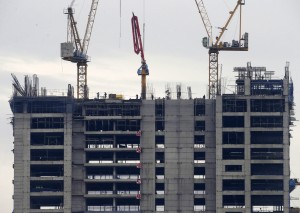PH ‘different’ from troubled Asean peers, say reports

The Philippines, Southeast Asia’s fastest-growing economy, can differentiate itself from its regional peers that are grappling with slowing growth and deteriorating external balance sheets, based on a common theme cited by international researchers in the past few days.
Although election spending was a factor behind the better-than-expected 7.5-percent gross domestic product (GDP) growth of the Philippines for the second quarter, a pace matched only by China, some of the reports cited some downside risks.
“The local economy’s resilience in the face of external turbulence reinforces our view that the Philippines is somewhat differentiated from its peers not only by having a structural current-account surplus but also by having local growth drivers, mainly public spending and private investments, to lean on. The latter may be traced to local economic authorities’ ability to pursue accommodative policies given a benign inflation outlook and manageable public debt,” New York-based think tank Global Source said in an Aug. 30 commentary written by Filipino economists Romeo Bernardo and Marie-Christine Tang.
In a separate research, Credit Suisse said: “We think the Philippines offers the best macroeconomic prospects out of the Asean-4 economies,” referring to the four emerging markets of Southeast Asia that also included Thailand, Indonesia and Malaysia.
“While the recent correction in regional Asean equity markets has no doubt impacted the Philippines equity markets, with the local equity market correcting by close to 14 percent in August, it is important to differentiate the Philippines from the other Asean-4 countries,” said the Credit Suisse report written by Michael Wan.
British bank Standard Chartered, in an Aug. 29 commentary, said that while Philippine markets were expected to remain volatile in the short term due to concerns on the tapering of the US Federal Reserve’s monetary stimulus, volatility would likely have “limited” effect on long-term Philippine economic trends.
“The Philippine has several strengths relative to its Asian peers. Solid domestic consumption and investment are likely to support growth in the next three years,” Stanchart said, adding that the economy ranked favorably based on Moody’s External Vulnerability Indicator, indicating its resilience to external shocks.
“In addition, strong remittance inflows from overseas workers more than make up for the trade deficit in the current account,” the bank said, noting that the 2012 current account surplus of 2.8 percent of GDP would have been a deficit of 4.3 percent if overseas workers’ remittances were excluded.
But Global Source, in the report titled “Differentiated,” noted that the pace of growth in the Philippines might fall below 7 percent starting this quarter due primarily to the disappearance of election-related stimulus and its impact on government and household spending.
The think tank also cited some downside risks based on the economic numbers released last week, including a decelerating year-on-year consumption growth over the past four quarters; more timid spending by government moving forward in the wake of the unfolding multibillion-peso pork barrel scandal; dampened investor confidence due to recent financial market developments, as already reflected by the decline in business confidence in the latest quarterly survey by the local central bank, and weakness in imports, including inputs to electronics goods, making a convincing export recovery story still elusive despite improving growth indicators in the US and China.
